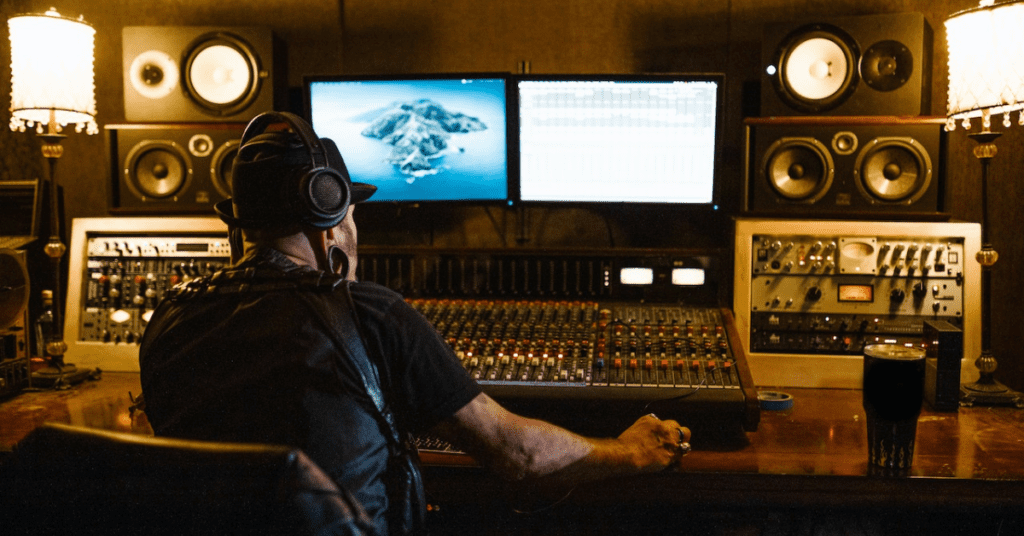Becoming a music producer is a big dream for many young people with a passion for music, but just how much does a music producer make?
On average, music producers can make anywhere between $25,000 and $1,000,000 or even more annually. The earnings of a music producer can fluctuate significantly based on factors such as experience, project type, and specific responsibilities.
- How Much Do Music Producers Earn per Song?
- Do All Music Producers Receive Royalties?
- How to Become a Music Producer?
- Is Pursuing a Music Producer Career Worthwhile?
- Who are the Top Earning Music Producers?
- Are Producers Wealthier than Singers?
- Essential Skills for a Music Producer
- Where Can I Learn Music Production?
- Conclusion
How Much Do Music Producers Earn per Song?
When it comes to earnings per song, music producers have a broad spectrum of income possibilities. Some producers might charge a one-time fee for their services, ranging from $300 to $10,000 or more. In contrast, others might work for royalties or a share of the song’s profits. This could potentially result in higher income if the song succeeds, especially in the US.
Do All Music Producers Receive Royalties?
It’s not a given that all music producers will earn royalties, as compensation methods can differ based on the particular arrangements established among the producer, the artist, and the record label. Generally, there are two primary payment structures for music producers: flat fees and royalties.
Flat fees represent single payments to the producer for their contributions to a project, without considering the commercial performance of the song or album. This form of payment is frequently determined beforehand and can differ significantly based on factors such as the producer’s standing, project budget, and the extent of the work required. Once the flat fee is paid, the producer usually does not gain any further income from the project.
Royalties refer to continuous payments to the producer contingent on the commercial achievements of the music they participated in creating. These payments typically constitute a portion of the revenue produced by the song or album, including sales, streaming earnings, or licensing fees. While royalties can offer a more considerable income for the producer if the music attains success, they also present an element of risk, as the producer’s income relies on the song or album’s market performance.


In certain instances, a music producer might work out a blended payment structure incorporating both flat fees and royalties. This setup enables the producer to obtain an upfront payment for their efforts while still reaping the rewards of the project’s potential success.
Ultimately, whether a music producer receives royalties depends on the specific terms negotiated in their contract with the artist or record label. Factors that can influence these negotiations include the producer’s experience and reputation, the artist’s career stage, and the expected commercial potential of the project.
How to Become a Music Producer?
Becoming a music producer involves developing a range of skills, knowledge, and industry connections. Here’s a step-by-step guide to help you get started on your journey to becoming a music producer:
Develop a strong foundation in music
Learn music theory, rhythm, melody, and harmony to understand the building blocks of music. Familiarize yourself with various music genres and styles to broaden your horizons and inspire your creativity.
Learn to play an instrument
While not always required, playing an instrument can help you better understand the creative process, collaborate with artists, and make informed decisions during production.


Master audio production software and hardware
Develop proficiency in digital audio workstations (DAWs) like Pro Tools, Logic Pro, Ableton Live, or FL Studio. Familiarize yourself with audio interfaces, microphones, MIDI controllers, and other essential equipment used in music production.
Study audio engineering and sound design
Learn about audio recording techniques, mixing, mastering, and sound design to create professional-quality music. Understand the concepts of frequency, dynamics, and audio effects, and how to use them effectively in your productions.
Practice, practice, practice
Produce your music or collaborate with local artists to gain experience and develop your unique sound. The more you practice, the more confident and skilled you’ll become.
Create a portfolio
Compile your best work into a portfolio or demo reel to showcase your skills, creativity, and versatility. This portfolio will be crucial for attracting clients and demonstrating your abilities to potential collaborators or employers.
Network and build connections
Attend music industry events, conferences, and workshops to meet other professionals, artists, and producers. Building a network of contacts can help you find opportunities, collaborate on projects, and learn from others in the field.


Promote yourself
Create a professional website, social media profiles, and business cards to showcase your work and services. Promote your music and brand through social media, music forums, and online communities to attract clients and increase your visibility.
Stay up-to-date with industry trends
Keep abreast of the latest music trends, technologies, and production techniques. Continuously learning and adapting will help you maintain a competitive edge and enhance your skills.
Consider formal education
While not always necessary, pursuing a degree or taking courses in music production, audio engineering, or a related field can help deepen your knowledge and increase your credibility in the industry.


Is Pursuing a Music Producer Career Worthwhile?
Deciding if a career as a music producer is worth pursuing hinges on personal objectives, passions, and circumstances. While some people may find the profession rewarding and satisfying, others might consider it demanding and not the right fit. Here are some aspects to weigh when determining if a music producer career is a suitable choice:
Love for Music
Having a deep love for music is crucial for success in this area. If you enjoy crafting, molding, and experimenting with sounds, collaborating with artists, and participating in the complete music production process, a music producer career might be an excellent match.
Innovation and Flexibility
The music landscape is ever-evolving, with new trends, technologies, and styles appearing frequently. As a music producer, you need to be innovative, flexible, and eager to learn and evolve with the industry to stay ahead of the competition.
Determination and Resilience
Achieving success as a music producer demands hard work, commitment, and tenacity. Building a name for yourself, creating a robust portfolio, and forging industry connections require time and effort. Be ready to invest in your career and tackle challenges along the journey.
Economic Security
While a music producer career can be financially gratifying if you succeed, it can also be uncertain, particularly at the start. You may experience periods of uneven income and must be prepared to handle your finances accordingly.
Social Skills
Cultivating relationships within the music industry is crucial for discovering new prospects and clients. You will need to actively engage in networking, attend industry gatherings, and work with artists to create a solid professional reputation.
Who are the Top Earning Music Producers?
The highest-earning music producers generally possess an extensive track record of successful projects, collaborations with well-known artists, and the ability to evolve within the dynamic music industry. While the roster of top-earning producers may shift over time, the following individuals have been recognized as some of the most prosperous and influential music producers up until 2021:
Dr Dre
Andre Romelle Young, professionally known as Dr. Dre, is a multifaceted American artist who has made a name for himself as a rapper, music producer, and entrepreneur. His work has significantly contributed to the careers of various successful artists, including Eminem, 50 Cent, and Kendrick Lamar. As the founder of Beats Electronics, which was acquired by Apple in 2014, Dr. Dre has produced numerous hit albums.


Pharrell Williams
As a producer, singer, and songwriter, Pharrell Williams has had a major impact on the music industry. He is one half of the production duo The Neptunes, who have worked with a wide range of artists, including Britney Spears, Jay-Z, and Justin Timberlake. Pharrell has also enjoyed a successful solo career, with hits like “Happy.”


Max Martin
Swedish music producer Max Martin is one of the most successful producers in pop music history. He has produced and co-written numerous chart-topping hits for artists like Britney Spears, Katy Perry, Taylor Swift, and Ariana Grande. With decades of experience, Max Martin has earned a reputation for his ability to create catchy and memorable pop songs.


Timbaland
Timbaland, born Timothy Zachary Mosley, is an American record producer, rapper, and DJ. He has produced hits for some of the biggest names in the music industry, such as Missy Elliott, Aaliyah, Justin Timberlake, and Beyoncé. Timbaland’s unique production style, which often incorporates unconventional sounds and rhythms, has made him one of the most sought-after producers in the industry.


Rick Rubin
With a career spanning several decades, Rick Rubin is a legendary music producer known for his work across various genres, including rock, hip-hop, and metal. Rubin has worked with a diverse array of artists, such as Johnny Cash, Beastie Boys, Red Hot Chili Peppers, and Adele. He is the co-founder of Def Jam Recordings and has a reputation for helping artists achieve their creative vision.


These top-earning music producers have all managed to leave a significant mark on the music industry through their talent, creativity, and ability to adapt to new trends and technologies.
Are Producers Wealthier than Singers?
The financial standing of producers relative to singers can differ considerably. While some producers may earn more than singers due to their participation in multiple projects, others might not be as financially successful. In the end, the earning potential for both producers and singers relies on factors such as talent, market demand, and the ability to negotiate advantageous contracts.
Essential Skills for a Music Producer
To excel as a music producer, an individual must possess a wide range of abilities, from technical know-how to interpersonal skills. Here are some vital skills for music producers:
1. Technical mastery
Music producers need expertise in operating digital audio workstations (DAWs), audio interfaces, microphones, MIDI controllers, and other crucial production tools. Additionally, they should be well-versed in audio recording methods, mixing, mastering, and sound design.
2. Understanding of music theory and composition
Possessing a solid foundation in music theory, including concepts like melody, harmony, rhythm, and song structure, is crucial. This knowledge enables better creative guidance, informed decision-making, and effective communication with artists and musicians.
3. Familiarity with instruments
Although not compulsory, knowing how to play an instrument or having a functional understanding of multiple instruments can improve collaboration with artists, help create arrangements, and elevate the overall production quality.
4. Inventiveness and originality
Music producers ought to be imaginative and willing to experiment with novel sounds, genres, and production methods. This approach aids in crafting a unique sound and maintaining a competitive edge in the dynamic music industry.
5. Versatility and resilience
The music industry is ever-changing, with new trends, technologies, and styles constantly emerging. A successful music producer should be capable of adapting to these shifts and adopting innovative ideas and techniques.
6. People and communication skills
Music producers frequently collaborate with artists, musicians, and engineers, making effective communication and teamwork essential. Establishing rapport, grasping the artist’s vision, and articulating ideas coherently are critical for a thriving production.
7. Efficient time management and organization
Music producers often balance numerous projects, deadlines, and tasks. Robust time management and organizational abilities are required for maintaining focus and ensuring tasks are completed in a timely manner.
8. Networking and relationship-building
Establishing connections within the music industry is essential for finding new opportunities, clients, and collaborators. Music producers must be proactive in networking, attending industry events, and building relationships with key players in the field.
9. Marketing and self-promotion
Music producers need to promote their services, showcase their skills, and build a brand to attract clients and increase visibility. This includes creating a professional website, social media presence, and a strong portfolio or demo reel.
10. Business and negotiation skills
Understanding contracts, royalties, and industry practices is important for protecting a producer’s interests and ensuring fair compensation. Negotiation skills help in securing favorable deals and building a sustainable career in music production.
Where Can I Learn Music Production?
There are numerous avenues available for learning music production, depending on your preferences, available resources, and learning style. Here is a list of various options you can consider for learning music production:
Universities and Colleges
Many universities and colleges offer degrees and courses in music production, audio engineering, or related fields. These programs can provide a comprehensive education in music theory, audio production techniques, and industry practices. Some renowned institutions for music production programs include:
- Berklee College of Music
- New York University’s Clive Davis Institute of Recorded Music
- University of Southern California’s Thornton School of Music
- Middle Tennessee State University’s Department of Recording Industry


Music Production Schools
Specialized music production schools focus on teaching audio production, mixing, mastering, and other related skills. Some popular music production schools are:


Online Courses and Tutorials
Online learning platforms offer a flexible and often cost-effective way to learn music production at your own pace. You can find many music production courses and tutorials on websites like:
- Coursera
- Udemy
- LinkedIn Learning (formerly Lynda.com)
- Skillshare
- ADSR Sounds
YouTube Channels
Many experienced music producers and audio engineers share their knowledge and techniques through YouTube channels. Some popular channels for learning music production include:
- Pensado’s Place
- Produce Like A Pro
- In The Mix
- Andrew Huang
Private Lessons
If you prefer one-on-one instruction, you can consider hiring a private music production tutor or mentor. Websites like TakeLessons or Lessonface can help you find a suitable instructor for personalized lessons.
Community Colleges and Local Workshops
Community colleges often offer music production courses at a lower cost than universities or specialized music schools. Additionally, local music stores or recording studios might organize workshops and training sessions on various aspects of music production.
Self-learning
Many successful music producers are self-taught, learning through experimentation, trial and error, and studying resources like books, blogs, and forums. To learn music production independently, immerse yourself in the craft, practice regularly, and seek feedback from peers and online communities.
Remember, the most suitable learning method depends on your personal goals, time, budget, and learning preferences. Whichever path you choose, dedicating time and effort to developing your skills is essential for success in music production.
Conclusion
In conclusion, the financial prospects for a music producer are as varied as the numerous genres and artists they collaborate with. With earnings greatly influenced by factors such as experience, location, industry connections, and the evolving dynamics of the music business, a music producer’s income can range from modest sums to six-figure salaries.
Although the digital era has challenged traditional revenue streams, it has also paved the way for innovative, passionate, and forward-thinking producers to capitalize on new opportunities. Ultimately, the earning potential of a music producer is not solely determined by the numbers, but by their ability to adapt, grow, and constantly refine their craft in an ever-changing industry landscape.

